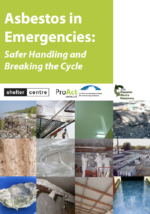
Asbestos, A brief guide to safer handling of asbestos in emergencies
ProAct
Link, English, 36 pages
Summary
After an emergency, shelter practitioners may have to deal with large quantities of hazardous waste including asbestos. In certain parts of the world, awareness of asbestos and the associated health risks is low; specialist handling and disposal facilities may not be available. This can have a negative impact on affected communities involved in clean-up operations. Available construction materials such as roofing sheets frequently contain asbestos and these products are commonly used in some countries. Use of new asbestos products perpetuates the problem for affected communities in the long term. The presence of asbestos may not be easy to detect as companies have been known to issue fake certificates; and testing facilities are not always available. Shelter specialists are likely come under pressure to use asbestos containing materials, often considered locally to be the best available option. This guide addresses these issues and provides practical advice for shelter specialists and other humanitarian workers confronted with asbestos in emergencies. It highlights key points and further references to help minimise the risk associated with dealing with existing asbestos products from damaged buildings and avoid the use of asbestos products for reconstruction.
Publication Year
2009
Topic
Construction | Health & Sanitation | Repair and Retrofitting
